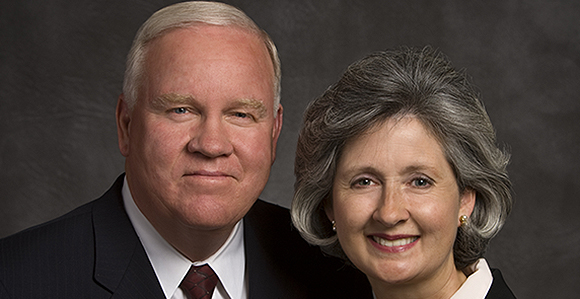Gratitude Protects Us against Pride, Elder Wilford W. Andersen Tells BYU Students
Contributed By Marianne Holman Prescott, Church News staff writer

Elder Wilford W. Andersen of the Seventy and his wife, Kathleen, April 2009. Elder Andersen spoke at a BYU devotional on November 7, 2017, about the pride cycle in the Book of Mormon, urging students to be grateful as a protection from this deadly sin.
Article Highlights
- Pride offends the Holy Ghost and alienates us from God.
- Gratitude protects us from pride.
- When we are humble and meek, we elevate God instead of ourselves.
“However you define pride, its consequences are always the same. It alienates us from God.” —Elder Wilford W. Andersen of the Seventy
PROVO, UTAH
“Gratitude will inoculate you against pride and make a way for your escape from the pride cycle,” Elder Wilford W. Andersen, General Authority Seventy, told Brigham Young University students during a campus devotional held in the Marriott Center on November 7.
“There is a prevalent pattern of behavior in the Book of Mormon commonly referred to as the ‘pride cycle,’” he said. “It is repeated so frequently that one begins to sense that the Lord and His prophets are trying to teach us something important—that perhaps its inclusion in the record is meant to be a warning from the Lord to each of us in our day.”
Recognizing that pride is a serious sin, Elder Andersen reminded listeners how in the book of Proverbs, pride is number one on the list of seven deadly sins that the Lord hates.
“However you define pride, its consequences are always the same,” he said. “It alienates us from God.”
Comparing pride to a clock, Elder Andersen walked listeners through the cycle—where 12 o'clock is the pinnacle of pride—and offered suggestions of how to prevent a person from becoming prideful.
Some characteristics of being at the pinnacle of pride are that a person feels successful, intelligent, popular, and invincible.
“We enjoy it when others compliment us on our successes, and we are irritated when others around us receive compliments on their successes,” he said. “At 12 o’clock, we tend not to listen to the counsel of others. We don’t need others. Sadly, we often conclude that we don’t even need God or His servants. We bristle at their counsel. We are doing just fine on our own.”
Sharing how prophets—both ancient and modern—have warned against unrighteous pride, Elder Andersen spoke of how as pride progresses, it offends the Spirit of the Holy Ghost.
“When we offend the Spirit, we cut ourselves off from the very source of all spiritual nourishment, and it is just a matter of time until we begin to wilt,” he said. “Without the help of the Lord and the influence of the Spirit, the gravitational pull of the pride cycle drags us down toward four o’clock failure.”
Explaining that a person can choose his or her conduct but they cannot choose the consequences of their conduct, Elder Andersen reminded listeners that as pride—or the clock in this example—continues, a person may experience pain or negative consequences and have to realize personal inadequacies.
“Failures and afflictions are not happy thoughts for any of us, but ironically, we often find that they are great blessings, because they tend to push us on around the pride cycle toward 6 o’clock humility,” he said. “Our journey from 4 o’clock failure to 6 o’clock humility can be strangely exhilarating. We begin to lose our pretensions. We are no longer trying to impress those around us. We begin to see things more clearly and more honestly. We are more comfortable with criticism and can smile at our own mistakes and weaknesses.”
At this point in the pride cycle, a person becomes truly humble, meek, and submissive.
“We should not make the mistake, however, of confusing meekness with weakness,” Elder Andersen taught. “It has been said that meekness is not a recognition of our weakness, but rather a recognition of the true source of our strength. There is nothing weak about meek. It’s just that when we are humble and meek, we don’t elevate ourselves; we elevate God.”
Recognizing that today’s society considers humility and meekness almost counterintuitive to success, Elder Andersen encouraged students to stay away from “trash talk, power politics, and end-zone victory dances.”
“When we are truly humble and meek, we turn back to God because there is often nowhere else to turn. Our hearts are now broken and our spirits are contrite. The world defines ‘brokenhearted’ as being overcome by grief or despair—something to be avoided if at all possible. But in the scriptures, having a broken heart is a peaceful and hopeful condition and ultimately a prerequisite to eternal glory.”
Humble obedience leads a person toward 10 o’clock, where a person experiences a state of blessed happiness.
“Ten o’clock on the pride cycle is a pleasant and wonderful place to be, but unfortunately, it is also a very dangerous place to be,” he warned.
With the clock at 10 o’clock, nearing the pinnacle of pride, it is important to be humble and thankful. It is through humility and being grateful that a person is able to exit the pride cycle and move toward God.
To do that, “we must recognize that every blessing we receive comes from Heavenly Father. He is the source of all that is good in our lives—the fount of every blessing.”
Although an exit from the pride cycle is not easy, it is possible.
“Recognize that all good things come from God,” he said. “He is the source of every blessing you receive. Fill your heart with gratitude for His merciful kindness. Treasure and follow the counsel of His servants. Your gratitude will inoculate you against pride and make a way for your escape from the pride cycle.”
